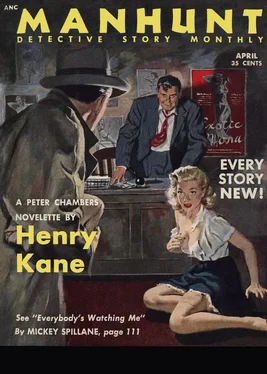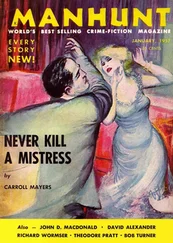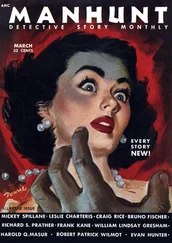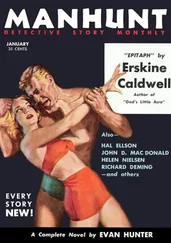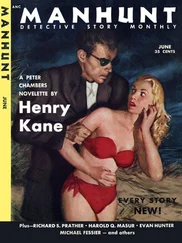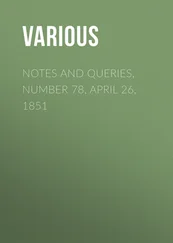Roy Carroll - Manhunt. Volume 1, Number 4, April, 1953
Здесь есть возможность читать онлайн «Roy Carroll - Manhunt. Volume 1, Number 4, April, 1953» весь текст электронной книги совершенно бесплатно (целиком полную версию без сокращений). В некоторых случаях можно слушать аудио, скачать через торрент в формате fb2 и присутствует краткое содержание. Город: New York, Год выпуска: 1953, Издательство: Flying Eagle Publications, Жанр: Детектив, на английском языке. Описание произведения, (предисловие) а так же отзывы посетителей доступны на портале библиотеки ЛибКат.
- Название:Manhunt. Volume 1, Number 4, April, 1953
- Автор:
- Издательство:Flying Eagle Publications
- Жанр:
- Год:1953
- Город:New York
- ISBN:нет данных
- Рейтинг книги:3 / 5. Голосов: 1
-
Избранное:Добавить в избранное
- Отзывы:
-
Ваша оценка:
- 60
- 1
- 2
- 3
- 4
- 5
Manhunt. Volume 1, Number 4, April, 1953: краткое содержание, описание и аннотация
Предлагаем к чтению аннотацию, описание, краткое содержание или предисловие (зависит от того, что написал сам автор книги «Manhunt. Volume 1, Number 4, April, 1953»). Если вы не нашли необходимую информацию о книге — напишите в комментариях, мы постараемся отыскать её.
Manhunt. Volume 1, Number 4, April, 1953 — читать онлайн бесплатно полную книгу (весь текст) целиком
Ниже представлен текст книги, разбитый по страницам. Система сохранения места последней прочитанной страницы, позволяет с удобством читать онлайн бесплатно книгу «Manhunt. Volume 1, Number 4, April, 1953», без необходимости каждый раз заново искать на чём Вы остановились. Поставьте закладку, и сможете в любой момент перейти на страницу, на которой закончили чтение.
Интервал:
Закладка:
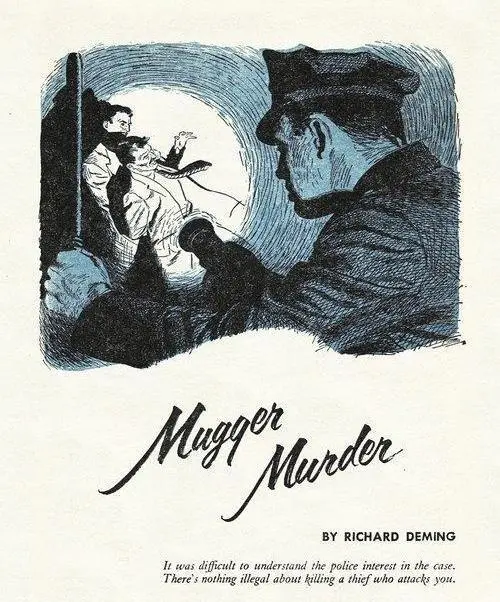
I was surprised to see Sergeant Nels Parker in the Coroner’s Court audience, for homicide detectives spend too much of their time there on official business to develop any morbid curiosity about cases not assigned to them. I was in the audience myself, of course, but as a police reporter this was my regular beat on Friday mornings, and after five years of similar Friday mornings, nothing but the continued necessity of making a living could have gotten me within miles of the place.
When I spotted him two rows ahead of me, I moved up and slid into the vacant seat next to him.
“Busman’s holiday, Sergeant?” I asked.
His long face turned and he cocked one dull eye at me. For so many years Nels had practiced looking dull in order to throw homicide witnesses off guard, the expression had become habitual.
“How are you, Sam?” he said.
“You haven’t got a case today, have you?” I persisted.
His head gave a small shake and he turned his eyes front again. Since he seemed to have no desire to explain his presence, I let the matter drop. But as the only inquest scheduled was on the body of a Joseph Garcia, age twenty-one and of no known address, I at least knew what case interested him.
The first witness was a patrolman named Donald Lutz, a thick bodied and round faced young fellow who looked as though he, like the dead man, was no more than twenty-one.
In response to the deputy coroner’s request to describe the circumstances of Joseph Garcia’s death as he knew them, the youthful patrolman said, “Well, it was Wednesday... night before last... about eleven thirty, and I was walking my beat along Broadway just south of Market. As I passed this alley mouth, I heard a scuffling sound in the alley and flashed my light down it. I saw these two guys struggling, one with a hammerlock on the other guy’s head, and just as my light touched them, the guy with the hammerlock gave a hard twist, the other guy went sort of limp, and the first guy let him drop to the alley floor. I moved in with my night stick ready, but the guy stood still and made no move either to run or come at me. He just stood there with his hands at his sides and said, ‘Officer, this man tried to rob me.’
“I told him to stand back, and knelt to look at the man lying down. Near as I could tell, he was dead, but in the dark with just a flashlight I couldn’t be sure, and I didn’t want to take a chance on him waking up and running away while I went to the nearest call box. So I stayed right there and used my stick on the concrete to bring the cop from the next beat. That was Patrolman George Mason.
“Mason went to call for a patrol car and a doctor while I staved with the two guys. That’s about all I know about things except when the doctor got there, he said the guy lying down was dead.”
The deputy coroner said, “And the dead man was later identified as Joseph Garcia?”
Patrolman Lutz nodded. “Yes, sir.”
“And the man Garcia was struggling with. Will you identify him, please?”
The policeman pointed his finger at a short, plump man of about fifty seated in a chair apart from the audience and within a few feet of where the jury was lined up along the left wall. He was a quietly dressed man with a bland, faintly vacuous smile and an appearance of softness about him until you examined him closely. Then you suspected that a good deal of his plumpness was muscle rather than fat, and you noticed his shoulders were unnaturally wide.
“That’s him there,” the young patrolman said. “Robert Hummel.”
Just in front of the platform containing the deputy coroner’s bench was a long table, one end pointing toward the platform and the other end toward the audience. On the right side of this table, seated side-wise to it with his back to the audience, sat the assistant circuit attorney in charge of the case. On its left side sat Marcus Prout, one of St. Louis’s most prominent criminal lawyers.
Now the assistant C.A. said, “Patrolman Lutz, I understand Robert Hummel had in his possession a .38 caliber pistol at the time of the incident you just described. Is that right?”
“Well, not exactly in his possession, sir. It was lying in the alley nearby, where he’d dropped it. It turned out he had a permit to carry it.”
Marcus Prout put in, “Officer, was there any other weapon in sight?”
“Yes, sir. An open clasp knife lay in the alley. This was later established as belonging to the deceased. Robert Hummel claimed Garcia drew it on him, he in turn drew his gun to defend himself, and ordered the deceased to drop the knife. However, the deceased continued to come at him. Hummel said he didn’t want to shoot the man, so he used the gun to knock the knife from Garcia’s hand, then dropped the gun and grappled with him.”
The lawyer asked, “Was there any mark on the deceased’s wrist to support that statement?”
“The post mortem report notes a bruise,” the deputy coroner interrupted, and glanced over at the jury.
Marcus Prout rose from his chair and strolled toward the patrolman. “Officer, did the deceased... this Joseph Garcia... have a police record?”
“Yes, sir. One arrest and a suspended sentence for mugging.”
“Mugging is a slang term for robbery with force, isn’t it?”
“Yes, sir. Generally without a weapon. You get a guy around the neck from behind and go through his pockets with your free hand. There’s other methods classified as mugging, but that’s the way Garcia did it the time he was convicted.”
The lawyer said, “Did you draw any inference from the fact that Robert Hummel, with a gun against a knife, used the gun merely to disarm his opponent and then grappled with him with his bare hands?”
The policeman said, “I don’t exactly know what you mean.”
“I mean, did it not occur to you as obvious Robert Hummel’s statement that he did not wish to shoot his opponent was true, and that he went out of his way to avoid seriously injuring Garcia, when under the circumstances he would have been fully justified in shooting the man through the heart? And that Garcia’s subsequent death in spite of Mr. Hummel’s precaution must have been an accident resulting from Robert Hummel exerting more strength than he intended in the excitement of the moment?”
This leading question would have been stricken from the record in a regular court, of course, for not only was it deliberately slanted at the jury rather than to the witness, it asked for an opinion on a matter of which the witness could not possibly have had actual knowledge. But in Coroner’s Court the legal formalities of a court of law are almost entirely lacking inasmuch as no one is on trial for anything, the jury’s sole duty being to determine how the deceased met death. I was therefore not surprised when neither the assistant circuit attorney nor the deputy coroner made any objection to the question.
Patrolman Lutz said he had not thought about the matter, which seemed to satisfy Marcus Prout, as he had asked the question only to implant it in the jury’s mind anyway. The lawyer went back to his seat.
When the deputy coroner asked if there were any more questions, both Prout and the assistant C.A. shook their heads. The patrolman was dismissed and Norman Paisley was called as a witness.
Norman Paisley was a thin, dried up man of middle age who looked like a school janitor. To the deputy coroner’s first question he gave his address as a rooming house on South Broadway two blocks south of Market.
“Were you a customer at Stoyle’s Tavern on Sixth near Olive this past Wednesday night?” the deputy coroner asked.
Читать дальшеИнтервал:
Закладка:
Похожие книги на «Manhunt. Volume 1, Number 4, April, 1953»
Представляем Вашему вниманию похожие книги на «Manhunt. Volume 1, Number 4, April, 1953» списком для выбора. Мы отобрали схожую по названию и смыслу литературу в надежде предоставить читателям больше вариантов отыскать новые, интересные, ещё непрочитанные произведения.
Обсуждение, отзывы о книге «Manhunt. Volume 1, Number 4, April, 1953» и просто собственные мнения читателей. Оставьте ваши комментарии, напишите, что Вы думаете о произведении, его смысле или главных героях. Укажите что конкретно понравилось, а что нет, и почему Вы так считаете.
